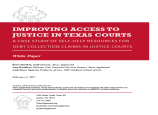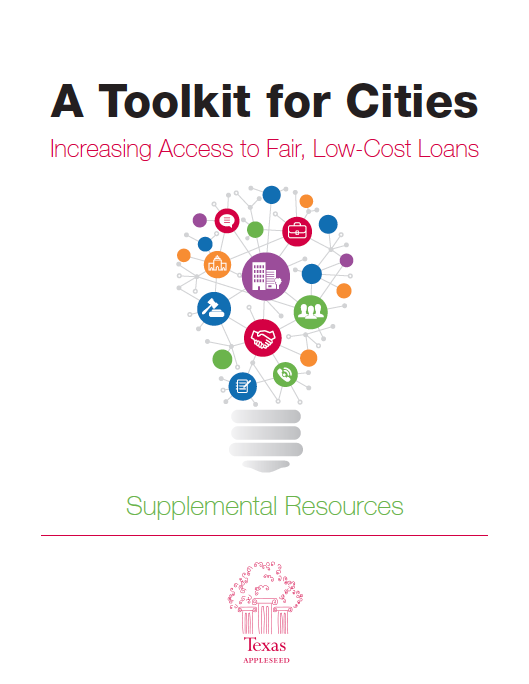Publications
(from the archives) Improving Access to Justice in Texas Courts
February 3, 2017
In justice courts, judges are not necessarily lawyers, and the rules of evidence may not apply. Most debt collectors have lawyers representing them; defendants in debt claim cases often do not have the benefit of a lawyer. Many Texans fall into a “justice gap” where they are not poor enough to qualify for free legal services, but also cannot afford to pay for legal services on their own. Because more and more Texans are trapped in this situation, many litigants are left arguing their cases on their own or “pro se,” without the help of a skilled advocate.
Key Findings: 1: Court website information is more helpful to plaintiffs than to defendants. 2: Most courts provide plaintiffs with forms to file debt claim cases. 3: No court provided defendants with answer forms specific to debt claim cases. 4: Links to applicable rules of civil procedure are available on most, but not all court websites.
December 2016 Newsletter
December 14, 2016
(from the archives) Dangerous Discipline: How Texas schools are relying on law enforcement, courts, and juvenile probation to discipline students (Online Version)
December 14, 2016
Dangerous Discipline is a report from Texas Appleseed and Texans Care for Children. Data collected from Texas school districts, municipal courts, juvenile probation departments, the Texas Education Agency, and student surveys show that students in Texas schools are arrested, are sent to adult criminal courts, referred to juvenile probation, and experience use of force incidents at alarming rates, often for relatively minor misbehaviors. These punitive discipline methods are disproportionately used against Black and Latino students and youth with disabilities even though students of color are no more likely to misbehave, and students with disabilities should be receiving supports from their schools.
(from the archives) Homeless Youth Handbook
December 8, 2016
The Texas Homeless Youth Handbook – created in partnership between Texas Appleseed, Baker & McKenzie and Weatherford – is a guide to help homeless youth better understand their legal rights, responsibilities and resources. Texas was the fourth state in the U.S. to have this particular resource.
(from the archives) A Toolkit for Cities: Increasing Access to Fair, Low-Cost Loans (Supplemental Resources)
September 27, 2016
Cities can make a difference for their citizens and local economies by enacting policies that constrain abuses surrounding high-cost payday and auto title loans and encouraging productive market options, such as low-cost loan products and local initiatives to promote financial well-being across neighborhoods in our cities. "A Toolkit for Cities" lays out specific opportunities any city can pursue, highlights benefits to cities and overall communities, and includes quick facts, tips, and case study examples of programs locally and across the nation. The toolkit includes details from how and why to partner with a local Council of Government (COG) to investing in low-cost lending programs to participating in an employer-based affordable loan program.
Pages
Criminal Discovery
Fair Defense Act
Immigrant Banking
Immigrant Children & Families
International Remittances
Mental Health
Fines & Fees
Foster Care & Courts
Homeless Youth
Insurance
Juvenile Justice
Other Issues
Payday & Auto Title Lending Reform
Protecting Seniors from Financial Abuse
Bail Reform & Pretrial Justice
Civil Asset Forfeiture
Coerced Debt
Debt Collection
Disaster Recovery & Fair Housing
Education Justice
Fair Financial Services
E-bulletins
Testimony
Handbooks
Amicus briefs
Newsletters
Brochures
Reports















